Businesses in New York state will likely have a chaotic few months as companies gauge the consequences of federal tariffs that took effect in the last week.
President Donald Trump made tariffs a central fixture of the economic strategy that helped him get elected last fall, and maintains they’ll offset national trade deficits.
Business leaders on Tuesday said it will be difficult for New York companies to prepare for import taxes of 10% or more on goods from over 60 countries and the European Union and how it will impact the Empire State.
“Where folks are taking advantage of American businesses [and] consumers in terms of their trade practices, let’s go after them, let’s do what we can to level that playing field,” Mike Elmendorf, president & CEO of the Associated General Contractors of New York State, told Spectrum News 1. “But that really is the type of project that calls for a sharp shooter, not a shotgun. And I think we’ve been dealing with a shotgun approach here.”
Elmendorf said contractors in the state are feeling the burden of new tariffs put in place by Trump’s administration.
Higher import taxes, like 35% on Canada, make it harder to estimate the cost, or scope, of construction projects.
Elmendorf said it’s throwing the industry into uncertainty.
“If you’re working on a private construction project, you may have the ability within your contract or with the owner to work out some sort of relief when you have an unexpected cost escalation,” he said. “When you get into public work, working for New York DOT, [the Office of General Services] or the MTA and other agencies, you may not have such flexibility. So it is a real challenge.”
The U.S. Commerce Department recently announced prices rose 2.6% in June compared to a year ago — a sign tariffs have started to drive up costs.
State business leaders are taking a wait-and-see approach, and haven’t settled on consistent advice for companies about how to prepare for tariff rates that change by the day. Trump on Monday extended a trade truce with China — the United States’ largest trading partner — for another 90 days.
The Business Council of New York State plans to administer a second informal survey to its more than 3,000 member companies and chambers of commerce about how tariffs have impacted business. The council will likely distribute the survey after Labor Day.
“We are in contact with our members regularly on many issues,” according to a statement from the council on Tuesday. “We did a brief informal survey earlier this year and many told us they are concerned the impacts of tariffs would raise prices on products for both manufacturers and consumers. We continue to have an open dialogue with members following the latest tariff mandates.”
But the impact is a waiting game for large and small businesses alike.
“Things have increased a little bit, but not drastically, so we’re kind of working with it,” said Theresa Morone, owner of Floral Accents in North Tonawanda.
The Western New York flower shop has been in business for 27 years, and gets flowers from Canadian growers in Southern Ontario and imports from other parts of the U.S.
Morone said distributors haven’t increased their prices because of tariffs yet, but companies in Asia have been slow to roll out holiday items, like ceramic pieces, she orders for the Thanksgiving and December holiday rush.
“Usually in June, July our manufacturers are sending us the holiday stuff to get the orders in, and I think I’ve received one catalog,” Morone said. “A few emails are trickling in…And I think that might be a sticky wicket to deal with.”
Some business owners who support Trump are in favor of the tariffs to combat unfair trade practices.
But greater revenue from tariffs is usually paid by the consumer. A recent analysis by Goldman Sachs economists found U.S. businesses have covered about 64% of the tariff bill from January through June.
“Consumers have footed about another 14% and there’s barely any revenue that’s new revenue being generated,” said Russell Weaver, director of research at the Cornell University ILR Buffalo Co-Lab. “This is being eaten up by businesses and households in the U.S. right now.”
Some small businesses in the state expect more costly imports will make them more competitive.
But economists argue it could limit consumer choices as the cost of living continues to go up, and tariffs won’t flip a switch to bring domestic manufacturing back to the U.S.
“There’s still a lag here,” Weaver said. “Right now, U.S. manufacturing businesses are most affected by this. The idea that will bring factories or locations back to the U.S. is great in theory, but again, it’s longterm. We can’t just build factories overnight. These are billion dollars worth of investments that need to be made.”
